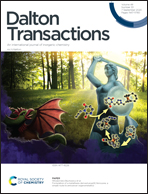Highly dispersed BiOCl decahedra with a highly exposed (001) facet and exceptional photocatalytic performance
Abstract
BiOCl has been identified to be a promising photocatalyst for the rapid photodegradation of organic pollutants, but its practical application was restricted by its limited photocatalytic activity. In this work, a highly reactive BiOCl decahedron photocatalyst with an exposed (001) facet was successfully hydrothermally synthesized via a simple hydrothermal method using bismuth nitrate (Bi(NO3)3·5H2O) and ammonium chloride (NH4Cl) as raw materials. By adjusting the dosage of NH4Cl, the BiOCl nanoplates transformed from hexahedra with quadrilateral {110} oblique facets to decahedra with octagonal {110} and {100} oblique facets. As compared to the original BiOCl nanoplates, decahedral BiOCl possesses much more oxygen-enriched surfaces and a narrowed bandgap, resulting in enhanced photocatalytic performance. The decahedral BiOCl photocatalyst achieves a high degradability of 98% for the photodegradation of RhB after 6 min of irradiation, which is much faster than that of a hexahedral BiOCl sample.



 Please wait while we load your content...
Please wait while we load your content...